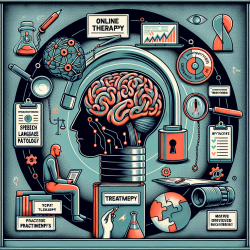In the field of speech-language pathology, echolalia has traditionally been viewed through a clinical lens, often categorized as a communication impairment or a restricted, repetitive pattern of behavior. However, a recent study titled ‘Let me tell you, I see echolalia as being a part of my son’s identity’: Exploring echolalia as an expression of neurodiversity from a parental perspective provides an alternative viewpoint. This research underscores the importance of considering echolalia not merely as a clinical condition but as an expression of neurodiversity, thereby advocating for a more inclusive and individualized approach.
Conducted by Cohn, Harrison, and McVilly (2023), this study utilized hermeneutic phenomenological analysis to delve into the experiences of 133 parents of children with echolalia. The findings reveal a counter-narrative that challenges prevailing clinical assumptions, proposing that echolalia should be celebrated as part of a child's unique identity rather than suppressed or modified.
Key Insights for Practitioners
For speech-language pathologists and other practitioners working with children exhibiting echolalia, this research offers several valuable insights:
- Embrace Individuality: Recognize that echolalia can be an integral part of a child's identity. Instead of focusing solely on modifying or suppressing this behavior, consider how it might be harnessed positively.
- Parental Perspectives: Understand that parents may have differing views on echolalia. Some parents in the study expressed that they do not wish for their child's echolalia to be intervened with, as they see it as an enjoyable and unique part of their child's personality.
- Holistic Approach: Adopt a holistic approach that incorporates both clinical expertise and the lived experiences of parents. This can lead to more personalized and effective intervention strategies.
- Neurodiversity-Affirmative Practice: Align with the growing movement towards neurodiversity-affirmative practices. This involves recognizing and valuing the diverse ways in which children communicate and express themselves.
Encouraging Further Research
The study by Cohn et al. (2023) highlights the need for further research into non-clinical perspectives of echolalia. Practitioners are encouraged to explore how neurodiversity-affirmative practices can be integrated into their work. By doing so, they can contribute to a more inclusive understanding of echolalia and other neurodiverse behaviors.
In conclusion, this research invites practitioners to reconsider traditional clinical perspectives on echolalia and to embrace a more inclusive, neurodiversity-affirmative approach. Such a shift not only respects the individuality of each child but also aligns with the broader movement towards recognizing and celebrating human diversity.
To read the original research paper, please follow this link: ‘Let me tell you, I see echolalia as being a part of my son’s identity’: Exploring echolalia as an expression of neurodiversity from a parental perspective.










